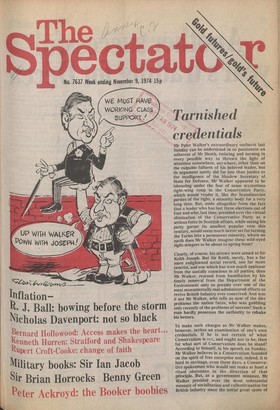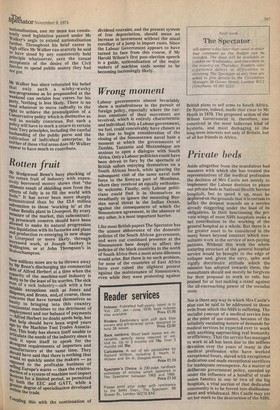Tarnished creden tials
Mr Peter Walker's extraordinary outburst last Sunday can be understood in so passionate an adherent of Mr Heath, twisting and turning in every possible way to thrown the light of attention somewhere, anywhere, other than on the culpable failures of his beloved leader, but its argument surely did far less than justice to the intelligence of the Shadow Secretary of State for Defence. Mr Walker appeared to be labouring under the fear of some mysterious right-wing coup in the Conservative Party, which would render it, like the Scandinavian parties of the right, a minority body for a very long time. But, aside altogether from the fact that a leader who has lost three elections out of four and who, last time, presided over the virtual elimination of the Conservative Party as a serious force in Scottish affairs, while seeing his party garner its smallest popular vote this century, would seem much better set for turning the Tories into a permanent minority, where on earth does Mr Walker imagine these wild-eyed right-wingers to be about to spring from?
Clearly, of course, his arrows were aimed at Sir Keith Joseph. But Sir Keith, surely, has a far more enlightened social record, one far more centrist, and one which has won much applause from the socially conscious in all parties, than Mr Walker, rescued from humiliation by his timely removal from the Department of the Environment only to preside over one of the most monumentally mal-administered efforts to revive British industry ever conceived. And was it not Mr Walker, who tells us now of the dire problems the nation faces, who was gabbling only recently of the problems of success? Such a man hardly possesses the authority to rebuke his betters.
To make such charges as Mr Walker makes, however, invites an examination of one's own credentials. If he is not certain of what Conservatism is not, and ought not to be, then for what sort of Conservatism does he stand? According to himself, in his speech on Sunday, Mr Walker believes in a Conservatism founded on the spirit of free enterprise and, indeed, it is hard to envisage, even these days, a Conservative spokesman who would not make at least a ritual obeisance in the direction of that principle. But, as a government minister, Mr Walker presided over the most substantial measure of socialisation and collectivisation for British industry since the initial great spate of nationalisation, and ivir Henn has consiste u..Y used legislation passed under Mr Walker's aegis to extend nationalisation further. Throughout his brief career in high office Mr Walker can scarcely be said to have stood by any consistently held Principle whatsoever, save the casual acceptance of the desire of the Civil Service to spend public money they had not got.
Mr Walker has since reiterated his belief that only such a wishy-washy non-programme as he propounded at the Weekend can reclaim lost voters for his PartY• Nothing is less likely. There is no need whatever to move radically to the tight to achieve the promulgation of a Conservative policy which is distinctive as well as socially conscious. But such a rey will have to mark a return to certain Lame Tory principles, including the careful nusbanding of the public purse and the cultivation of individual enterprise. In neither of these vital areas does Mr Walker appear to have much to contribute.



































 Previous page
Previous page